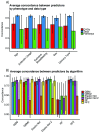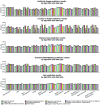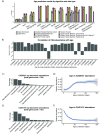A systematic machine learning and data type comparison yields metagenomic predictors of infant age, sex, breastfeeding, antibiotic usage, country of origin, and delivery type
- PMID: 32392251
- PMCID: PMC7241849
- DOI: 10.1371/journal.pcbi.1007895
A systematic machine learning and data type comparison yields metagenomic predictors of infant age, sex, breastfeeding, antibiotic usage, country of origin, and delivery type
Abstract
The microbiome is a new frontier for building predictors of human phenotypes. However, machine learning in the microbiome is fraught with issues of reproducibility, driven in large part by the wide range of analytic models and metagenomic data types available. We aimed to build robust metagenomic predictors of host phenotype by comparing prediction performances and biological interpretation across 8 machine learning methods and 4 different types of metagenomic data. Using 1,570 samples from 300 infants, we fit 7,865 models for 6 host phenotypes. We demonstrate the dependence of accuracy on algorithm choice and feature definition in microbiome data and propose a framework for building microbiome-derived indicators of host phenotype. We additionally identify biological features predictive of age, sex, breastfeeding status, historical antibiotic usage, country of origin, and delivery type. Our complete results can be viewed at http://apps.chiragjpgroup.org/ubiome_predictions/.
Conflict of interest statement
I have read the journal's policy and the authors of this manuscript have the following competing interests: CJP is a founder and advisor at XY.ai. ADK is a founder of and advisor at DeepBiome Therapeutics.
Figures




References
-
- Zeevi D, Korem T, Godneva A, Bar N, Kurilshikov A, Lotan-Pompan M, et al. Structural variation in the gut microbiome associates with host health. Nature. 2019; 1. - PubMed

